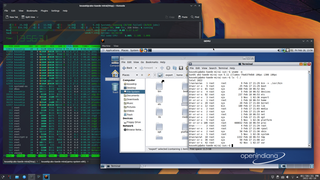Microsoft Windows is a product line of proprietary graphical operating systems developed and marketed by Microsoft. It is grouped into families and sub-families that cater to particular sectors of the computing industry -- Windows (unqualified) for a consumer or corporate workstation, Windows Server for a server and Windows IoT for an embedded system. Defunct families include Windows 9x, Windows Mobile, Windows Phone, and Windows Embedded Compact.
DECnet is a suite of network protocols created by Digital Equipment Corporation. Originally released in 1975 in order to connect two PDP-11 minicomputers, it evolved into one of the first peer-to-peer network architectures, thus transforming DEC into a networking powerhouse in the 1980s. Initially built with three layers, it later (1982) evolved into a seven-layer OSI-compliant networking protocol.

XNU is the computer operating system (OS) kernel developed at Apple Inc. since December 1996 for use in the Mac OS X operating system and released as free and open-source software as part of the Darwin OS, which in addition to macOS is also the basis for the Apple TV Software, iOS, iPadOS, watchOS, visionOS, and tvOS OSes.
Nucleus RTOS is a real-time operating system (RTOS) produced by the Embedded Software Division of Mentor Graphics, a Siemens Business, supporting 32- and 64-bit embedded system platforms. The operating system (OS) is designed for real-time embedded systems for medical, industrial, consumer, aerospace, and Internet of things (IoT) uses. Nucleus was released first in 1993. The latest version is 3.x, and includes features such as power management, process model, 64-bit support, safety certification, and support for heterogeneous computing multi-core system on a chip (SOCs) processors.

The Blackfin is a family of 16-/32-bit microprocessors developed, manufactured and marketed by Analog Devices. The processors have built-in, fixed-point digital signal processor (DSP) functionality performed by 16-bit multiply–accumulates (MACs), accompanied on-chip by a microcontroller. It was designed for a unified low-power processor architecture that can run operating systems while simultaneously handling complex numeric tasks such as real-time H.264 video encoding.

QEMU is a free and open-source emulator. It emulates a computer's processor through dynamic binary translation and provides a set of different hardware and device models for the machine, enabling it to run a variety of guest operating systems. It can interoperate with Kernel-based Virtual Machine (KVM) to run virtual machines at near-native speed. QEMU can also do emulation for user-level processes, allowing applications compiled for one architecture to run on another.

Git is a distributed version control system that tracks changes in any set of computer files, usually used for coordinating work among programmers who are collaboratively developing source code during software development. Its goals include speed, data integrity, and support for distributed, non-linear workflows.
In software development, distributed version control is a form of version control in which the complete codebase, including its full history, is mirrored on every developer's computer. Compared to centralized version control, this enables automatic management branching and merging, speeds up most operations, improves the ability to work offline, and does not rely on a single location for backups. Git, the world's most popular version control system, is a distributed version control system.

Mercurial is a distributed revision control tool for software developers. It is supported on Microsoft Windows, Linux, and other Unix-like systems, such as FreeBSD and macOS.
The ETRAX CRIS is a RISC ISA and series of CPUs designed and manufactured by Axis Communications for use in embedded systems since 1993. The name is an acronym of the chip's features: Ethernet, Token Ring, AXis - Code Reduced Instruction Set. Token Ring support has been taken out from the latest chips as it has become obsolete.

Das U-Boot is an open-source boot loader used in embedded devices to perform various low-level hardware initialization tasks and boot the device's operating system kernel. It is available for a number of computer architectures, including 68k, ARM, Blackfin, MicroBlaze, IBM S360, My66, Motorola 68000, MOS 6502, ARM64 MIPS, Nios, SuperH, PPC, RISC-V and x86.

The Linux kernel is a free and open-source, monolithic, modular, multitasking, Unix-like operating system kernel. It was originally written in 1991 by Linus Torvalds for his i386-based PC, and it was soon adopted as the kernel for the GNU operating system, which was written to be a free (libre) replacement for Unix.

netsniff-ng is a free Linux network analyzer and networking toolkit originally written by Daniel Borkmann. Its gain of performance is reached by zero-copy mechanisms for network packets, so that the Linux kernel does not need to copy packets from kernel space to user space via system calls such as recvmsg . libpcap, starting with release 1.0.0, also supports the zero-copy mechanism on Linux for capturing (RX_RING), so programs using libpcap also use that mechanism on Linux.
Checkpoint/Restore In Userspace (CRIU), is a software tool for the Linux operating system. Using this tool, it is possible to freeze a running application and checkpoint it to persistent storage as a collection of files. One can then use the files to restore and run the application from the point it was frozen at. The distinctive feature of the CRIU project is that it is mainly implemented in user space, rather than in the kernel.

Banana Pi is a line of single-board computers produced by the Chinese company Shenzhen SINOVOIP Company, its spin-off Guangdong BiPai Technology Company, and supported by Hon Hai Technology (Foxconn). Its hardware design was influenced by the Raspberry Pi, and both lines use the same 40-pin I/O connector.

RIOT is a small operating system for networked, memory-constrained systems with a focus on low-power wireless Internet of things (IoT) devices. It is open-source software, released under the GNU Lesser General Public License (LGPL).

Windows Subsystem for Linux (WSL) is a feature of Windows that allows developers to run a Linux environment without the need for a separate virtual machine or dual booting. There are two versions of WSL: WSL 1 and WSL 2. WSL 1 was first released on August 2, 2016, and acts as a compatibility layer for running Linux binary executables by implementing Linux system calls on the Windows kernel. It is available on Windows 10, Windows 10 LTSB/LTSC, Windows 11, Windows Server 2016, Windows Server 2019 and Windows Server 2022.

Cyphal is a lightweight protocol designed for reliable intra-vehicle communications using various communications transports, originally destined for CAN bus, but targeting various network types in subsequent revisions. OpenCyphal is an open-source project that aims to provide MIT-licensed implementations of the Cyphal protocol. The project was known as UAVCAN prior to rebranding in March 2022.

Windows Terminal is a multi-tabbed terminal emulator developed by Microsoft for Windows 10 and later as a replacement for Windows Console. It can run any command-line app in a separate tab. It is preconfigured to run Command Prompt, PowerShell, WSL and Azure Cloud Shell Connector, and can also connect to SSH by manually configuring a profile. Windows Terminal comes with its own rendering back-end; starting with version 1.11 on Windows 11, command-line apps can run using this newer back-end instead of the old Windows Console.













